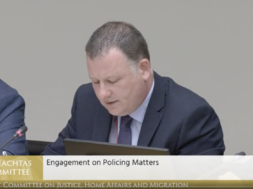Criminal Justice (Burglary of Dwellings) Bill 2015 Second Stage Speech by the Minister for Justice and Equality, Frances Fitzgerald TD
Check Against Delivery
01 October 2015
I move that the Bill be read a second time.
I am pleased to present the Criminal Justice (Burglary of Dwellings) Bill 2015 to this House.
This Bill is targeted at those repeat burglars who have previous convictions and are charged with multiple offences of residential burglary. It strengthens the provisions for refusal of bail and provides for tougher sentencing for repeat home burglars.
Burglary
Burglary is a persistent and highly damaging crime, particularly in the very distressing situations where householders may be assaulted by the criminals involved. I am conscious of the serious impact of these offences on families and communities and I recognise the public concern at these crimes.
The importance of the home is recognised by Article 40.5 of the Constitution which states “The dwelling of every citizen is inviolable and shall not be forcibly entered save in accordance with law.”
The courts have recognised that burglary of a person’s home is a heinous and traumatic crime. In its judgment in the 2006 case of DPP v. Barnes, the Court of Criminal Appeal stated that:
“The offence of burglary committed in a dwellinghouse is in every instance an act of aggression, an attack on the personal rights of the citizen as well as a public crime and is a violation of him or her.”
The background to this Bill is that earlier this year, in response to concern about a rise in domestic burglaries, I initiated an urgent and broad review of the criminal justice system’s response to the problem.
The review included a focus on interagency measures in relation to the management of prolific offenders, visible policing, crime prevention support for communities, and an examination of legislative issues. As part of the review, I convened and chaired a high-level meeting, which was attended by the Garda Commissioner, the Probation Service and the Irish Prison Service.
Repeat Offenders
An important fact which emerged during the review was the finding that a large proportion of domestic burglaries are committed by serial offenders. Figures from the Garda Síochána Analysis Service indicate that approximately 75% of property offences are committed by 25% of offenders.
I have been consistent in my view that serious offenders and serial offenders must continue to be imprisoned. Public safety is of paramount importance and I am absolute about this.
In this regard, I firmly believe that targeting the small, hardened cohort of repeat burglars has the very real potential to significantly reduce the number of burglaries being committed.
With this in mind, the review I referred to identified two key problems which can be tackled by legislation. One relates to repeat offenders who are granted bail despite being charged with multiple burglaries and who often commit further burglaries while on bail. The other relates to the fact that relatively short sentences can be imposed by the courts when multiple burglary offences are taken into account.
There is evidence of a high rate of recidivism for burglary. Data from the 2013 Irish Prison Service Recidivism Study shows a recidivism rate of over 79% among persons imprisoned for burglary and related offences. Data from the 2008 – 2013 Probation Service Recidivism Study shows a recidivism rate of 49% among persons engaging with the Probation Service for burglary and related offences. These recidivism rates are the highest rate for any offence group. They are considerably higher than the overall recidivism rates indicated by both studies.
Garda Response:
Tackling crime and burglaries remains a top priority for the Government and for An Garda Síochána. I am in close contact with the Garda Commissioner to ensure that the policing response is effective and that Garda operations take account of evolving trends and patterns in burglary offences, both in rural and urban areas.
In recent times, Garda strategy to counter burglaries and related crimes has been co-ordinated under Operation Fiacla, which is a national operation targeting burglary by using an intelligence and analysis-led approach. In support of Operation Fiacla, there are burglary related operations in place in each Garda Division.
Special targeted patrols have been implemented with the assistance of Garda National Support Services against criminal groups. These arrangements have also targeted the use of motorways by criminal gangs and have contributed to the arrest of a number of high-priority suspects.
The sustained Garda response under Operation Fiacla has produced many successes in disrupting those involved in this type of criminal activity. As of 31 August 2015, Operation Fiacla had led to 14,381 arrests, with 8,181 persons charged.
Garda Vehicles
Work is progressing on updating the Garda operational response to burglary. I recently authorised €700,000 for new specialised vehicles to support Gardaí in responding to current and emerging crime threats, including burglaries committed by highly-mobile gangs.
This is being supported by the allocation of €1.75 million to An Garda Síochána to upgrade surveillance equipment on Garda aircraft, including infra-red cameras for night-time use which will greatly enhance the capacity of Gardaí to monitor and track mobile gangs and tackle night-time burglars.
More generally, this Government has invested nearly €29 million in new Garda vehicles since 2012, with 370 new vehicles coming on stream since the start of this year.
The Government’s investment in new Garda vehicles clearly supports the Gardaí in being mobile, responsive and visible in the community, both urban and rural, as well as being critical to supporting the work of the Traffic Corps and national units.
More particularly, in terms of rural policing, our priority has been focussed on delivering highly-mobile and responsive Garda patrols in rural communities which are being supported by this Government’s ongoing high level of investment in new vehicles.
Capital Plan 2016
This investment is only the start. The Government’s Capital Plan 2016-2021, published on Tuesday, includes an unprecedented allocation of €875 million in capital funding along with approval for further public-private partnership projects in the Justice sector.
I particularly welcome the total allocation of €46 million for Garda vehicles which proves this Government’s ongoing priority commitment to ensure that the Garda fleet is modern, effective and fit-for-purpose. Funding will be provided for both regular Garda patrol vehicles as well as specialist, high-power vehicles for targeted operations.
I also on Tuesday announced substantial additional investment of €205 million in new technology and systems for An Garda Síochána, which delivers my commitment to progress important reforms of An Garda Síochána on foot of last year’s comprehensive report from the Garda Síochána Inspectorate.
This allocation will deliver new systems which will ensure a more responsive deployment of Gardaí in the community and improved Garda response times. Examples of the new integrated systems to be developed through this investment include:
· New Computed Aided Dispatch system – to ensure more responsive and coordinated deployment of Gardaí in the community and to improve Garda response times;
· Mobile technology – to give Gardaí secure mobile access to critical information when and where they need it.
· Investigations Management Systems – to ensure enhanced management of crime investigations
· Extending the rollout of Automated Number Plate Recognition (APNR) – to enhance policing of road safety and compliance;
These and other new technology solutions for use by Gardaí will cut back on the amount of time involved in paperwork, so that Gardaí can spend more time engaged in front-line policing.
With this investment we will consign outdated paper-based practices to the dustbin and equip our police service for the digital era.
New and refurbished Garda stations
In addition to the ongoing construction of three new Divisional Headquarters in Kevin Street, Dublin, Galway city and Wexford Town, I also on Tuesday announced that €18 million is being provided for the refurbishment of Garda stations throughout the country. In addition a new public-private partnership project will be developed to provide new Garda stations at a number of locations through the state; as well as providing new facilities such as modern PEMS (Property and Exhibit Management Stores) in a number of Garda stations throughout the country. Further details of this project will be announced in due course.
Garda Recruitment
Of course, the fight against burglaries and crime generally will be aided greatly by this Government’s decision to recruit new Gardaí. In September 2014, the Government reopened the Garda College in Templemore for new recruits for the first time since 2009.
Since then, four intakes of new Garda trainees have entered the Garda College, giving a total intake of just under 400 recruits. Of these, 290 have already attested and are now working in communities nationwide. In addition, 150 more recruits are due to enter the Garda College by year end. This additional recruitment will bring to 550 the total number of Garda trainees recruited under this Government between September 2014 and 2015.
It is my intention that there will be ongoing recruitment of Garda trainees throughout 2016. This ramped-up recruitment underscores the Government’s determination to deliver an effective, responsive police service to protect our communities and respond to emerging crime trends.
Community Engagement
The Gardaí continue to pursue a range of measures to support elderly and more vulnerable people in the community, working closely with Community Alert, Neighbourhood Watch and other community groups.
Community partnership has been particularly evident in the success of the Garda Text Alert scheme. Since it was launched in September 2013, this initiative has developed as an important crime prevention mechanism. There are over 600 local groups involving in excess of 120,000 subscribers. An estimated 200,000 text messages are sent each month under the scheme. I am informed that every Garda Division, rural and urban, now offers the text alert service and An Garda Síochána has published guidelines to assist in the establishment and operation of local groups.
“Cash for Gold”
I am aware of the concerns that have been expressed regarding the risk that “Cash for Gold” and other outlets which purchase second-hand jewellery and precious metal from the public could be used by criminal elements to dispose of stolen goods, particularly from home burglaries.
I recently announced a public consultation on the possible regulation of “Cash for Gold” outlets and the second-hand sale of precious metals. A consultation document setting out a number of policy options for mitigating risks in this area is available on my Department’s website. The closing date for receipt of submissions is 30th October 2015.
Reform of Bail
Deputies will also be aware that I published the General Scheme of a new Bail Bill in July. This new Bill will seek to improve the operation of the bail system and make the law as effective as possible in protecting the public against crimes committed by persons on bail while also safeguarding the rights of the accused person.
I have outlined a range of initiatives which are being taken to confront repeat offenders and protect households and businesses around the country. I am confident that these measures, including new legislation and targeted Garda operations, will strengthen my carefully considered approach to dealing with serial offenders and supporting improved community safety.
Provisions of Bill
I will now outline the provisions of the Bill.
Bail in burglary cases
Section 1 of the Bill seeks to ensure that prolific burglars can be refused bail in appropriate cases.
At the outset, it is necessary to recall that a decision to grant bail in a particular case is a matter for the court, which is, subject only to the Constitution and the law, independent in the exercise of its judicial functions. There is a constitutional presumption in favour of bail because in the eyes of the law, a person is innocent until proven guilty.
Prior to 1997, bail could be refused essentially only on the grounds that a person would be likely to abscond or interfere with witnesses or evidence. Section 2 of the Bail Act 1997, which gave effect to the Sixteenth Amendment of the Constitution, permits the courts to refuse bail to a person charged with a serious offence where refusal of bail is reasonably considered necessary to prevent the commission of a serious offence by that person. Burglary offences are designated as serious offences for the purposes of the Bail Act.
However, it is clear that prolific burglars with numerous previous convictions are repeatedly granted bail, despite Garda objections, even when charged with a series of burglaries.
Section 1 of the Bill will add new provisions to section 2 of the Bail Act 1997.
The new provisions will apply where a court is considering a bail application from an adult charged with a “relevant offence” alleged to have been committed in a dwelling. A “relevant offence” is defined as a burglary or aggravated burglary offence contrary to section 12 or 13 of the Criminal Justice (Theft and Fraud Offences) Act 2001 respectively.
For the purposes of bail applications in such cases, the court must consider previous convictions for domestic burglary coupled with pending charges or recent convictions as evidence that the accused person is likely to commit a further domestic burglary.
Turning to the detail of the provisions, the new subsection (2A) applies where a court is deciding whether it is reasonably considered necessary to refuse bail to prevent the commission of a serious offence by a person who is charged with a burglary alleged to have been committed in a dwelling.
In such a case, if certain circumstances exist, as set out in subsection (2B), the court must consider the existence of those circumstances as evidence that the person is likely to commit a further domestic burglary.
These circumstances are that the person has a previous conviction for domestic burglary committed in the 5 years before the bail application and that:
(i) the person has been convicted of at least 2 domestic burglaries committed in the period starting 6 months before and ending 6 months after the alleged commission of the offence for which he or she is seeking bail, or
(ii) the person has been charged with at least 2 domestic burglaries allegedly committed in the same period, or
(iii) the person has been convicted of at least one domestic burglary committed, and charged with at least one other domestic burglary allegedly committed, in the same period.
The provisions, while making it clear that prolific burglars should be refused bail in the circumstances set out in the Bill, will leave the courts all necessary discretion to vindicate the constitutional rights of an accused person in relation to bail.
The new subsection (2C) provides that a reference in subsection (2B) to a conviction for a relevant offence includes a conviction that is currently under appeal.
The new subsection (2D) provides that subsection (2B) will not prejudice the operation of section 258 of the Children Act 2001, which provides for the non-disclosure of certain findings of guilt relating to offences committed by persons under the age of 18.
A new subsection (4) will be inserted into section 2 of the Bail Act to define “dwelling” and “relevant offence” for the purposes of the new provisions.
Consecutive Sentences for Burglary
Section 2 of the Bill seeks to deal with the related problem of concurrent sentences being handed down for multiple burglaries. In many cases, relatively short sentences are imposed when multiple burglary offences are taken into account by the court.
Section 2 will insert a new section 54A into the Criminal Justice (Theft and Fraud Offences) Act 2001. The new section will require a court which decides to impose custodial sentences for multiple domestic burglary offences committed within a 12 month window, to impose such sentences consecutively.
The new section applies only to a “relevant offence”, which means a burglary or aggravated burglary. The provisions will apply only to adults previously convicted of a domestic burglary committed in the five years before the burglary offence for they are being sentenced.
Subsection (1) of the new section 54A will apply where an adult:
(a) is being sentenced to imprisonment for a domestic burglary,
(b) was convicted of another domestic burglary committed in the 5 years before the offence for which he or she is currently being sentenced, and
(c) was sentenced to imprisonment for another domestic burglary committed in the period starting 6 months before and ending 6 months after the burglary offence for which he or she is now being sentenced.
In such a case, any sentence of imprisonment which the court chooses to impose for the burglary for which the person is currently being sentenced must be consecutive to any sentence of imprisonment imposed for the prior domestic burglary offences.
Subsection (2) makes it clear that where a prior burglary offence would come within paragraphs (b) and (c) of subsection (1), that offence may be considered for the purpose of satisfying either paragraph (b) or (c) but not both.
Subsection (3) provides that subsection (1) will apply only where the burglary offence for which the person is being sentenced was committed after the Bill comes into operation, and will apply whether the other offences were committed before or after that date.
Subsection (4) provides that the aggregate term of imprisonment for consecutive sentences imposed by the District Court under the new provisions can extend to but not exceed 2 years. No such restriction will apply to the Circuit Court.
Subsection (5) provides that a reference in subsection (1) to a conviction for a relevant offence includes a conviction that is currently under appeal.
Subsection (6) defines “dwelling” and “relevant offence” for the purposes of the new section.
The discretion of a court whether or not to impose a custodial sentence will not be restricted by the new provisions.
Finally, section 3 is a standard provision providing for the short title and commencement of the Bill.
In conclusion, I would like to mention a newspaper opinion piece from the Sunday Times of 20th September, which reflected on the effects of burglaries in rural communities. It concluded that the new Bill would be a lever for change which would have the effect of
“… – obliging the criminal justice system to lock up violent, repeat criminals, while dealing more humanely with non-violent offenders – it should be welcomed as a progressive measure. And rural Ireland will be a safer place on winter nights.”
This Bill targets repeat burglary offenders through bail measures and provisions concerning the imposition of consecutive sentencing for repeat offending. The key objective of this legislation is to target a cohort of persistent offenders who prey on law-abiding householders and clearly have no concern for the damage and distress which they inflict on other people.
The Bill is designed to keep these repeat burglars off the streets and to improve the safety of our communities. I hope that the Bill will be passed by the Dáil and Seanad as early as possible.
I commend the Bill to the House.
END









